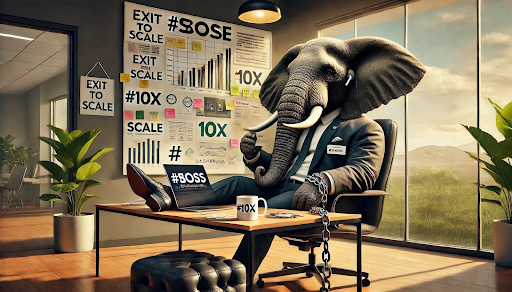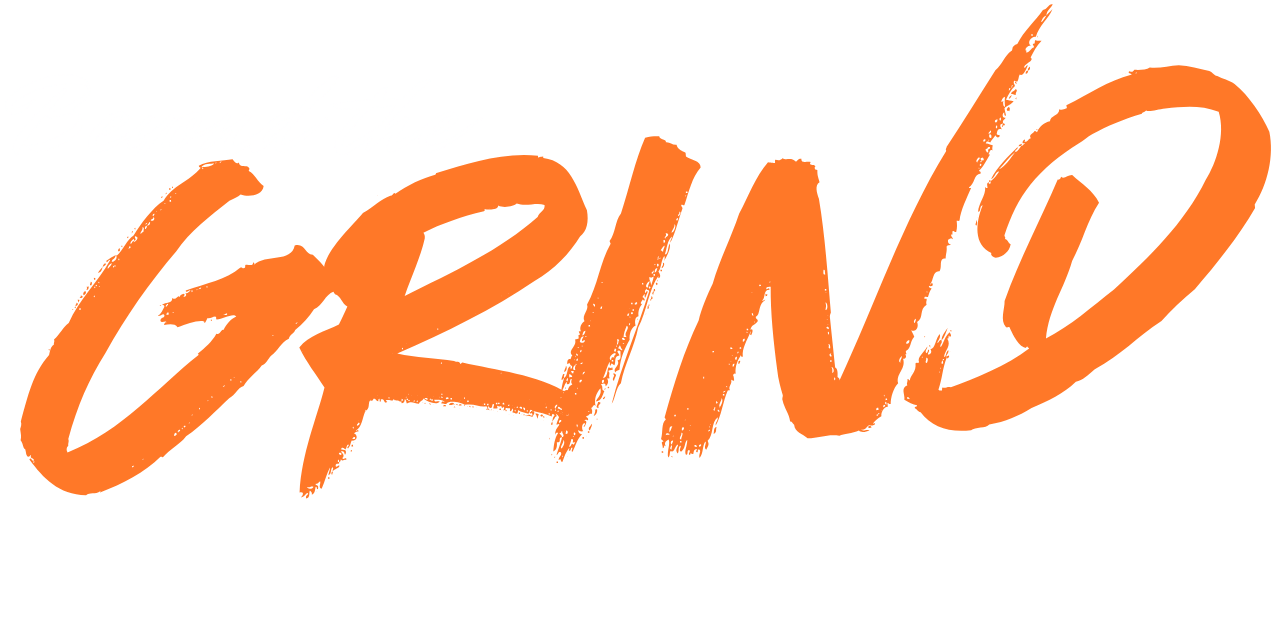Why Entrepreneurs Choose Comfortable Business Chains Over Freedom
Oct 08, 2025I'm The Real Jason Duncan, back with another edition of Beyond the Grind – showing entrepreneurs how to stop being slaves to their own businesses and start building assets that run without them.🚀
Sometimes slavery doesn't look like force – it looks like comfort.
It's the steady paycheck that keeps an employee at a job they hate. The warm familiarity of a relationship that's broken but predictable. The easy hit of Netflix or TikTok after a long day, even when it leaves you empty.
Nobody's holding a whip. Nobody's locking the door. And yet, people stay put.
Not because they love the chains – but because the chains come padded with perks.
The Elephant's Choice
In circuses years ago, trainers used a simple trick to keep elephants in place.
When the animal was young, they tied its leg to a heavy chain and a solid stake in the ground. The calf would pull and struggle, but the chain was too strong.
Eventually, it gave up.
Here's the surprising part: when that same elephant grew to full size – strong enough to snap the chain or yank the stake from the ground with ease – it never tried again.
All it took was the memory of failure and the comfort of routine. A creature that could roam free stayed put, chained by nothing more than old habits.
But here's what most people miss about that elephant: it wasn't just chained by memory. It was chained by perks.
Food showed up on time. There was shelter from the weather. Life felt predictable.
Why strain for freedom when captivity offered comfort?
That's how most of us live.
The chains that hold us aren't always iron. They're habits, comforts, and small rewards. They don't look like slavery.
They look like perks.

The Ancient Warning
This pattern isn't new. As I introduced in my previous writing, centuries ago, a brilliant young French writer named Étienne de La Boétie – "E.B." for short – wrestled with the same question at just 20 years old: why do people surrender their freedom so easily?
His answer was what he called "voluntary servitude."
But E.B. saw something deeper than habit keeping people stuck.
He argued that rulers don't stay in power just because people get used to obeying – they stay in power because they offer just enough perks to make obedience feel worthwhile.
A little comfort here.
A small reward there.
Just enough to make captivity feel easier than the uncertain work of freedom.
Centuries later, Aldous Huxley echoed the same warning in Brave New World.
His citizens weren't forced into slavery. They were lulled into it with "soma" – a pleasure pill that kept everyone calm and happy while their freedom quietly disappeared.
Different chains.
Same outcome.
Perks can be more dangerous than force because they make you complicit in your own captivity.
The Entrepreneur's Trap
Sounds like history or fiction? It's happening in your business right now.
Entrepreneurs cling to their own chains because those chains come with perks:
-
The ego boost of being indispensable
-
The thrill of solving problems no one else can
-
The pride when a client says, "I only trust you"
-
The comfort of knowing that if you handle it yourself, it'll get done right
Each of those perks feels good in the moment.
But together, they reinforce the Hero Syndrome.
They keep you at the center of everything – every sale, every decision, every crisis.
I've seen it firsthand.
One entrepreneur told me, "I know I should delegate more, but I just like being the closer. That's what I'm best at."
He wasn't lying.
He was great at closing.
But the very perk that gave him a rush also guaranteed he'd never step away from his company without it stalling.
Like the elephant who could break free but chooses the familiar stake, entrepreneurs often choose the comfortable chains of being needed over the uncertain work of building systems that don't need them.
The truth is harsh: what feels like strength is often just servitude in disguise.
The Cost of Perks-as-Chains
Here's the cruel truth about those entrepreneurial perks: they create a feedback loop that makes freedom harder to choose over time.
Every time you get that ego boost from being indispensable, it reinforces the behavior.
Every time you solve the problem no one else can, it feels like proof that you should keep solving problems.
Think about that entrepreneur who said he "just likes being the closer."
The more deals he closed personally, the more convinced he became that personal closing was essential.
The perk wasn't just a reward – it was programming him to stay trapped.
This is why successful entrepreneurs often struggle the most with letting go.
The bigger the business you've built through the Hero Syndrome, the more "evidence" you have that being the hero works.
Your $10 million revenue feels like validation that micromanaging was the right choice.
Meanwhile, the very behaviors that deliver those good feelings are quietly destroying your options.
Buyers don't want a business that depends on the founder's need to be needed.
They want systems, not personalities.
The perks whisper convincing lies: "You're too important to step back. The business would suffer without your personal touch. This client relationship belongs to you."
But every time you listen to those whispers, you're trading future freedom for present comfort.
You're choosing the elephant's stake over the wide-open world beyond the circus.
That's the real cost of perks-as-chains: they don't just keep you stuck – they make staying stuck feel like the smart choice.
Exit Without Exiting: Breaking the Addiction
The antidote to perks-as-chains isn't willpower – it's replacement.
You have to swap the immediate dopamine hit of being the hero for the deeper satisfaction of building something that works without you.
This is where my #ExitWithoutExiting method becomes your liberation strategy.
Instead of going cold turkey on control, you systematically transfer the sources of your "highs" to other people and processes.
Here's how to break the cycle:
- Pick one dependency and remove yourself measurably. Don't try to delegate everything at once. Choose the client relationship, decision type, or crisis that currently gives you the biggest ego boost – then design a way for someone else to own that win.
- Create new success metrics. Instead of measuring how many problems you solved, start tracking how many problems got solved without you. Instead of counting deals you closed personally, count revenue that closed while you were absent.
- Run systematic absence audits. Start with a few hours, then a full day, then a week. The goal isn't to abandon the business – it's to prove to yourself that your worth isn't measured by how much the company needs you in the moment.
- Document the handoff, not just the process. Write down exactly what success looks like when someone else handles "your" client or "your" decision. This turns subjective control into objective results.
The hardest part isn't building the systems – it's giving up the rush that comes from being irreplaceable.
But every successful transfer proves that your value as an owner grows when your necessity as an operator shrinks.
When you finally step back and watch revenue flow, problems get solved, and clients stay happy without your direct involvement, you'll discover a different kind of high: the satisfaction of building something bigger than yourself.
The Payoff
When you finally stop feeding the perks that keep you chained, something remarkable happens: you discover what real freedom feels like.
Instead of the quick hit of solving someone else's crisis, you get the sustained satisfaction of watching your team handle crises without you.
Instead of the ego boost of being the only one who can close a deal, you experience the deeper pride of building a sales process that works regardless of who runs it.
The elephant who breaks free doesn't just escape the circus – it remembers what it was built for.
You weren't built to be the smartest person in every meeting or the only one who can make decisions.
You were built to create something that outlasts your daily involvement.
Here's what that freedom actually looks like:
- You take a two-week vacation and come back to find the business didn't just survive – it thrived. New deals closed. Problems got solved. Clients stayed happy. Your absence proved your success, not your failure.
- You say no to a meeting and realize the world doesn't end. The decision gets made, the project moves forward, and you discover that not everything requires your personal genius.
- You stop measuring your worth by how many fires you put out and start measuring it by how few fires need putting out in the first place.
- Most importantly, you rediscover the vision that made you start the business in the first place – not to create a job that owns you, but to build something meaningful that serves others long after you step back.
That's the real payoff of breaking free from perks-as-chains: you trade the temporary high of being needed for the lasting satisfaction of being significant.
Your Next Move
Like the elephant who finally tests the rope and discovers it was never as strong as it seemed, your freedom begins with one simple act: pulling against a chain you've accepted for too long.
This week, choose one perk to refuse:
- Hand off a client relationship you've been hoarding because "they only trust you." Let someone else earn that trust.
- Skip a meeting where you usually play the hero. See if the team makes good decisions without your input.
- Let someone else solve the crisis that would normally give you that familiar rush of being indispensable.
- Document one process you've been keeping in your head so others can't do it "wrong."
The goal isn't perfection – it's disruption.
You're not trying to build the perfect system this week.
You're trying to break the perfect excuse that keeps you chained.
Start small.
Start messy.
Start today!
Because every elephant who ever broke free had to pull against the rope at least once to discover it was only as strong as their belief in it.
Words of Wisdom
"The simple believe anything, but the prudent give thought to their steps." – Proverbs 14:15
The perks of chains whisper seductive lies that sound perfectly reasonable: "You're needed in every meeting. Only you can handle the important clients. Being indispensable is job security."
But wisdom says: pause, step back, and consider where this path actually leads.
The elephant believed the chain was unbreakable because breaking free felt too risky to test.
The entrepreneur believes they're irreplaceable because stepping back feels too dangerous to try.
Both beliefs feel true until you examine them carefully.
Prudence isn't about avoiding all risk – it's about recognizing which risks are real and which are just comfortable illusions.
The risk of stepping back isn't as great as the risk of never testing your chains.
Freedom requires thought, not blind belief in the perks that keep you comfortable.
Until next time…
Go beyond the grind,
The Real Jason Duncan 🚀
Ready to break free from the comfortable chains that keep you trapped in your business? Discover how to build systems that deliver real freedom through my proven #ExitWithoutExiting method. Join successful entrepreneurs who've learned to step back without stepping away at The Exiter Club


